
- St John WA has a database of patients who have known Primary Adrenal Insufficiency (Addison's Disease) and have communicated their needs to Clinical Services. Crews' will be notified when attending these patients by way of a Medical Warning as displayed on the CAD, with instructions to call the Clinical Support Paramedic in the State Operations Centre. The CSP, with access to the Special Medications Authority, will authorise crews' to administer the patient's own hydrocortisone (known as Solu-cortef) when patients are found to be experiencing adrenal crisis.
- Crews should review the Symptoms: Acute Phase section of this document to familiarise themselves with the presentation of Adrenal Crisis.
- Once confirmed and authorised to administer the patient's own hydrocortisone, the crew needs to follow the below instructions, in order to administer Solu-cortef.
- Equipment required:
- Solu-cortef medication
- Vanishpoint™ Syringe 23G (3cc) for intramuscular Injection
- Cannulation equipment as per clinical skill for intravenous injection
- Alcohol prep pad
- Sharps container
- Procedure:
- Double check expiration date on side of the vial
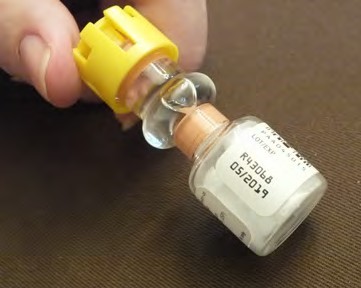
- Push the stopper with your thumb to engage the powdered medication with the solution in the vial
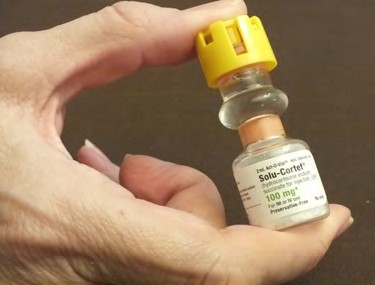
- Mix the power and solution – DO NOT SHAKE THE VIAL
- Gently "swirl" the vial or rock the vial back and forth to allow it to mix completely
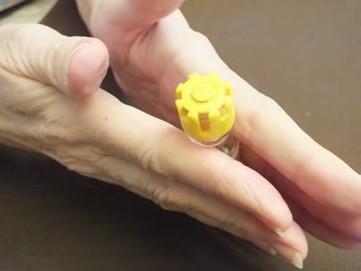

- Confirm the medication is completely mixed
- Remove yellow tab at the top of the vial as shown
- Wipe top of the vial with an alcohol prep pad

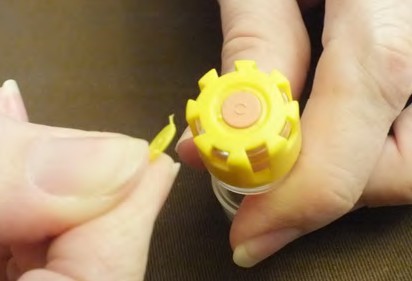
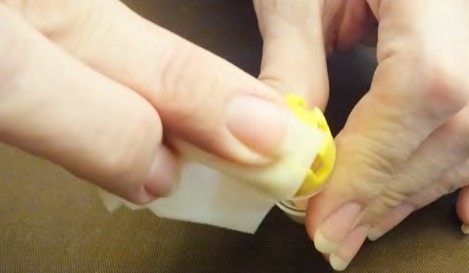
- Given the Solu-cortef is a sealed vial, it is easiest to inject a small amount of air into the vial through the rubber stopper before aspirating the medication.
- Invert the vial and remove all of the medication
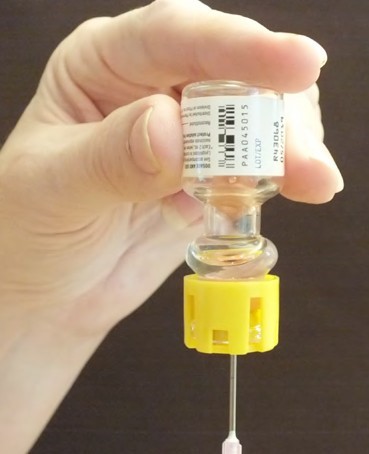
- Expunge any air from the syringe.
- Intravenous Injection: Once IV access has been established, administer the medication.
- Intramuscular Injection: As per the clinical Skill, administer the Solu-cortef in
the patients mid-lateral thigh.
- Apply pressure to the injection site and apply a Band-Aid to the site, if needed.
- Double check expiration date on side of the vial
- Note: IM is the preferred method of administration in an emergency situation, though it can be administered intravenously if peripheral IV access is already established.
Introduction
Addison’s disease (or Primary Adrenal Insufficiency), is rare endocrine condition; one type of adrenal insufficiency whereby the adrenal glands cease to function and the body no longer produces enough mineralocorticoid or glucocorticoid hormones. In adrenal insufficiency, the hormones that the body no longer produces enough of are:- Cortisol, aldosterone and DHEA (primary adrenal insufficiency).
- Cortisol and DHEA (secondary adrenal insufficiency).
Types of Adrenal Insufficiency:
- Primary: Diseases of the adrenal gland e.g. Addison’s Disease, Congenital Adrenal Hyperplasia (CAS), Adrenoleukodystrophy
- Secondary: Diseases of the pituitary gland (ACTH deficiency) or hypothalamus e.g. Hypopituitarism; Craniopharyngioma/other suprasellar tumours; and head injuries
- Iatrogenic (chronic corticosteroid treatment): e.g. Crohn’s disease, Juvenile arthritis, SLE, Asthma, Nephrotic syndrome, Haemangiomas
Adrenal crisis is a life threatening emergency caused by the adrenal glands inability to produce sufficient cortisol in response to major stress. Between 5% to 10% of all people with diagnosed and treated adrenal insufficiency will experience at least one adrenal crisis per year. There is an uneven distribution in the occurrence of crises, as some people do not experience a single adrenal crisis for decades, while others do so recurrently. The incidence of an adrenal crisis increases with age, especially above 50 years of age.
An adrenal crisis can be precipitated by a significant illness, trauma or stress and/or non-compliance with medications. The most frequent causes of adrenal crises in people with already diagnosed chronic adrenal insufficiency are infections, particularly gastroenteritis (“stomach flu” with diarrhoea and vomiting), pneumonia / lower respiratory tract infections and urinary tract infections. In addition surgery, strenuous exercise, emotional stress, dehydration and accidents can contribute and/or lead to an adrenal crisis. An adrenal crisis usually takes several hours to develop but can occur more quickly. If left untreated, it can be fatal.
Symptoms
Acute phase
Adrenal Crisis presents with the following signs and symptoms:
- Nausea, vomiting & diarrhoea
- Mottled appearance, peripheral shutdown
- Abdominal pain, weakness
- Low blood pressure, postural hypotension
- High fever
- Hypoglycaemia
- Lethargy, pallor
- Dizziness, mental confusion/loss of consciousness
- Rapid heart rate
- Rarely, patients in adrenal crisis may present with severe psychosis
Note: Any, or all, of the above signs and symptoms may be present
Primary care diagnosis
Patients with adrenal failure typically report overwhelming exhaustion, weight loss, poor appetite and dizziness on standing. Nausea, muscle weakness with cramps, abdominal, joint or back pains are often present. A preference for salty foods and increased thirst/urination are common. Key signs are deepening skin pigmentation, low blood pressure and a drop in blood pressure on standing (postural hypotension; a 20 mmHg drop on standing from a seated position indicates clear postural hypotension). Psychosis is occasionally documented; anxiety or minor depression may be observed accompanying chronic exhaustion.
A family medical history will often identify endocrine or autoimmune conditions linked with Addison’s among the extended family. There are typically:
- Thyroid disorders
- Diabetes
- Premature ovarian failure
- B12 deficiency
- Vitiligo
- Coeliac disease.
Symptoms reported by patients are shown below; few patients report the full complement of symptoms.
- A - Always tired (94%)
- D - Dizzy when standing (79%)
- D - Drop in blood pressure on standing (77%)
- I - Inexplicable weight loss (86%)
- S - Skin colour changes (80%)
- O - Only eating sparingly (anorexia) (76%)
- N - No strength in hand grip or limbs (91%)
- S - Sick or nauseous (73%)
Epidemiology
The occurrence of Addison disease is rare. The reported prevalence in countries where data are available is approximately 40-60 cases per 1 million population and affects males and females in equal numbers. Because cases of Addison’s disease may go undiagnosed, it is difficult to determine its true frequency in the general population. Addison’s disease can potentially affect individuals of any age and whilst almost half of all diagnoses occur outside of the most common age of onset, it usually occurs in individuals between 30-50 years of age.
Risk Factors
Autoimmune (primary) Addison’s is often associated with conditions such as:
- Hypothyroidism (range 43-44%)
- Asthma (13-15%)
- Vitiligo (9-10%)
- Vitamin B12 deficiency (7-9%)
- Type 1 diabetes (5-6%)
- Premature ovarian failure (5-12%)
- Coeliac (3-6%) Disease
- Hyperthyroidism (4-5%)
Adrenal failure may be the first autoimmune condition to manifest; pre-existing associated conditions are more likely in women. In established diabetes, a marked reduction in the insulin requirement can be a warning sign of developing hypoadrenalism. Commencing thyroid replacement in early stage adrenal failure may precipitate hypoadrenal symptoms/crisis, as thyroid hormones increase the metabolic rate and breakdown of thyroid hormone.
Elevated TSH in isolation may be an indicator of hypoadrenalism in an ill patient with extreme fatigue but without the typical features of hypothyroidism, and may return to normal with steroid replacement.
Management
Where the patient shows signs of adrenal crisis – typically, persistent vomiting with profound muscle weakness, hypotension, headache, extreme sleepiness or even coma – the patient should be admitted to hospital as an emergency. Paramedics must ensure the patient is stabilised by a saline infusion (for volume repletion) prior to transfer and preferably also by a 100mg hydrocortisone injection. If too much hydrocortisone is administered during an adrenal crisis, it will do no harm. There is no known toxic dose of hydrocortisone.
Hydrocortisone sodium succinate or hydrocortisone sodium phosphate may be used for injection, but not hydrocortisone acetate (Hydrocortistab) This is a specific slow acting preparation for joint injections.
Complications
Untreated Addison’s disease is universally fatal and the patient may die quite rapidly from adrenal crisis. In adrenal crisis, hypovolaemic shock, cardiac arrest, stroke or other circulatory complications can occur even in young, fit patients; complications from hypoxia may leave the patient permanently disabled. Children with adrenal crisis are particularly susceptible to hypoglycaemia, which can cause permanent brain damage if not quickly reversed. Where the patient has severe hyponaetremia, rapid or over-correction can lead to cerebral oedema or central pontine myelinolysis.
It should be noted that there are a subset of Addison's Disease patients' whom are known as 'ultra-rapid metabolisers' of steroid medication. The cytochrome P450s (CYPs) are a superfamily of oxidative liver enzymes of which the CYP3A subfamily is responsible for the metabolism of approximately 50% of all drugs; in this subset of patients, there is variability in the expression of CYP3A4 enzyme, which can cause unpredictable inter-individual drug responses. These patients typically require up to 3x the normal amount of hydrocortisone in adrenal crisis; these administrations should be spaced 15-20 minutes apart and be given only if the patient remains symptomatic.
Page contributors:
Clinical Resources Website
St John Ambulance Western Australia Ltd (ABN 55 028 468 715) (St John WA) operates ambulance and other pre-hospital clinical services. St John WA’s Clinical Resources, including its Clinical Practice Guidelines (Clinical Resources), are intended for use by credentialed St John WA staff and volunteers when providing clinical care to patients for or on behalf of St John WA, within the St John WA Clinical Governance Framework, and only to the extent of the clinician’s authority to practice.
Other users – Terms of Use
The content of the St John WA Clinical Resources is provided for information purposes only and is not intended to serve as health, medical or treatment advice. Any user of this website agrees to be bound by these Terms of Use in their use of the Clinical Resources.
St John WA does not represent or warrant (whether express, implied, statutory, or otherwise) that the content of the Clinical Resources is accurate, reliable, up-to-date, complete or that the information contained is suitable for your needs or for any particular purpose. You are responsible for assessing whether the information is accurate, reliable, up-to-date, authentic, relevant, or complete and where appropriate, seek independent professional advice.
St John WA expressly prohibits use of these Clinical Resources to guide clinical care of patients by organisations external to St John WA, except where these organisations have been directly engaged by St John WA to provide services. Any use of the Clinical Resources, with St John WA approval, must attribute St John WA as the creator of the Clinical Resources and include the copyright notice and (where reasonably practicable) provide a URL/hyperlink to the St John WA Clinical Resources website.
No permission or licence is granted to reproduce, make commercial use of, adapt, modify or create derivative works from these Clinical Resources. For permissions beyond the scope of these Terms of Use, including a commercial licence, please contact medservices@stjohnambulance.com.au
Where links are provided to resources on external websites, St John WA:
- Gives no assurances about the quality, accuracy or relevance of material on any linked site;
- Accepts no legal responsibility regarding the accuracy and reliability of external material; and
- Does not endorse any material, associated organisation, product or service on other sites.
Your use of any external website is governed by the terms of that website, including any authorisation, requirement or licence for use of the material on that website.
To the maximum extent permitted by law, St John WA excludes liability (including liability in negligence) for any direct, special, indirect, incidental, consequential, punitive, exemplary or other loss, cost, damage or expense arising out of, or in connection with, use or reliance on the Clinical Resources (including without limitation any interference with or damage to a user’s computer, device, software or data occurring in connection with such use).
Cookies
Please read this cookie policy carefully before using Clinical Resources from St John WA.
The cookies used on this site are small and completely anonymous pieces of information and are stored on your computer or mobile device. The data that the cookies contain identify your user preferences (such as your preferred text size, scope / skill level preference and Colour Assist mode, among other user settings) so that they can be recalled the next time that you visit a page within Clinical Resources. These cookies are necessary to offer you the best and most efficient possible experience when accessing and navigating through our website and using its features. These cookies do not collect or send analytical information back to St John WA.
Clinical Resources does integrate with Google Analytics and any cookies associated with this service enable us (and third-party services) to collect aggregated data for statistical purposes on how our visitors use this website. These cookies do not contain personal information such as names and email addresses and are used to help us improve your user experience of the website.
If you want to restrict or block the cookies that are set by our website, you can do so through your browser setting. Alternatively, you can visit www.internetcookies.com, which contains comprehensive information on how to do this on a wide variety of browsers and devices. You will find general information about cookies and details on how to delete cookies from your device. If you have any questions about this policy or our use of cookies, please contact us.